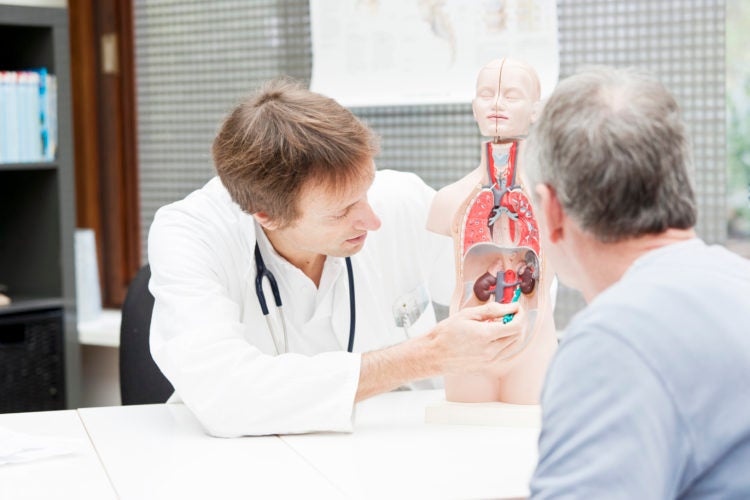-
Spotlight on the Symptoms of Kidney Cancer

The kidneys are found in the lower back. Each kidney is about the shape of a fist. When cancer cells develop in one or both of these organs, it’s referred to as kidney cancer. Like all forms of cancer, early detection is crucial for the most favorable outcome. Unfortunately, the signs and symptoms of kidney cancer don’t typically develop until the later stages of the disease. If you do notice anything abnormal, talk to a urologist right away. Prompt medical care could save your life.
Urologic Symptoms
Urologic symptoms are changes that involve the urinary system or region. Some patients with kidney cancer report having low back pain on one side that isn’t caused by an injury. It may also be possible to feel a lump or a mass in this area. Hematuria is another possible urologic sign of kidney cancer. This refers to blood in the urine. The urine may look pinkish, red, or even darker, like cola. Note that hematuria can also be caused by urinary tract infections (UTIs), kidney infections, and bladder or kidney stones. Seeing blood in the urine doesn’t automatically mean that you have cancer. However, you should consult a urologist promptly, and hematuria should never be considered “normal.”
Systemic Symptoms
In addition to the localized symptoms, patients may experience symptoms that can affect the whole body. Excessive fatigue is one example of a systemic symptom. Others include unintentional weight loss not caused by dieting and a persistent fever that isn’t caused by an infection. Some patients may report a loss of appetite. Because of the excessive fatigue, patients may have a blood test to check for anemia. Those with kidney cancer may be diagnosed with a low red blood cell count.
You’ll find state-of-the-art diagnostics and cutting-edge care at Urology Associates, P.C. Our cancer treatment specialists in Tennessee focus on treating the whole patient by developing personalized treatment plans and providing compassionate, attentive care. You can call us at (855) 901-1338 to request a visit with one of our highly trained urologists.
-
Factors That Can Contribute to Low Libido

Sexual dysfunction is more common than you might think. One of the more common sexual health problems is low libido, which can affect both women and men. Low libido, or a low sex drive, can involve a lack of desire for sex or masturbation, a lack of sexual fantasies, and psychological distress regarding these issues. For older men, low libido is often caused by the natural decline in testosterone as a man ages.
For men and women, low libido can also be caused by depression, anxiety disorders, or other mental health problems. Severe or chronic stress, low self-esteem, and a poor body image can also contribute to a low sex drive. Some people experience low libido because of a past history of physical or sexual abuse. And in some cases, low libido can be attributed at least in part to certain prescription medications, alcohol use, or drug use.
At Urology Associates, P.C., your sexual health will be treated with the utmost in respect, dignity, and compassion. Our providers offer comprehensive treatment for sexual dysfunction throughout Middle Tennessee. Call (855) 901-1338.
-
How Urinary Incontinence Affects Women
Urologists treat more women for urinary incontinence than men. Incontinence is more likely to affect women because of anatomical differences, and because the stresses of pregnancy and childbirth can weaken the muscles and tissues surrounding the bladder. Although incontinence is common for women, you don’t have to live with it. Talk to a doctor about your symptoms.
As you’ll learn when you watch this video, the urologist may diagnose you with stress incontinence, urge incontinence, or overflow incontinence. Stress incontinence is particularly common. It happens during any activities that exert abdominal pressure, such as laughing or sneezing.
Effective treatments for incontinence are available at Urology Associates, P.C. Call (855) 901-1338 to request an appointment with one of our urologists in Tennessee.
-
A Look at Different Types of Kidney Stones
Kidney stones occur when minerals clump together inside the kidneys. If you see a urologist for kidney stone treatments, one thing he or she will try to do is determine what kind of kidney stones you have.
This video examines some of the different types of kidney stones. The type of stone is determined by the minerals it contains. By knowing what type of kidney stones you have, your urologist is able to give you better advice about how to prevent another attack in the future.
For kidney stones, UTIs, and more choose Urology Associates, P.C. for your care. You can learn more about all our services and schedule an appointment with a urologist in Nashville by calling (855) 901-1338.
Recent Posts
categories
- Uncategorized
- Bladder Cancer
- Women's Sexual Health
- MonaLisa Touch
- Urology
- Urologist
- Erectile Dysfunction
- Kidney Cancer
- Incontinence
- Prostate
- MonaLisa Touch Laser Treatment
- Kidney Stones
- Urinary Tract Infections
- Event
- Sexual Dysfunction
- Testicular Cancer
- Prostate Cancer
- Urology Surgery Center
- urinary incontinence
- vaginismus
- noncoital pain disorder
- Hypoactive Sexual Desire Disorder
- Infographic
- provenge
- Xofigo
- robotic surgery
- hormone replacement
- diabetes
- renal cell carcinoma
- pelvic pain
- hematuria
- sexual health
- chronic testicular pain
- premature ejaculation
- Men's Health Clinic
- Dr. Melvin Seard
- Interstitial Cystitis
- vasectomy
- overactive bladder
- vaginal atrophy
- nocturia
- bladder infections
- urethral strictures
- Acute Epididymitis
- low sex drive
- circumcision
- pelvic floor dysfunction
- Peyronie's Disease
- prostatitis
- female sexual dysfunction
- varicocele
- difficult urination
- low libido
- PSA levels
- male fertility
- penile prosthesis
- prostatic intraepithelial neoplasia
- male infertility
- estrogen levels
- nurse navigator
- stress urinary incontinence
- vaginal yeast infection
- elevated psa
- painful sex
- adult circumcision
- epididymitis
- OAB
- kidney infection
- penile cancer
- pelvic organ prolapse
- Vasectomy Reversal
- bone health
- cystectomies
- clinical trials
- bloody urine
- Advanced Therapeutic Center
- WISH MedSpa
- neurogenic bladder
- WISH Team
- prostate biopsies
- BPH
- fecal incontinence
- lithotripsy
- osteoporosis
- kidney cysts
